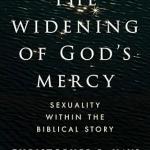Some books and songs and movies and talks stay with you, and the longer they stay with you, the more you feel the need to share them. This past January, I heard a short discussion of St. Thomas Aquinas’s thought (called Thomism) that was among the most compelling I’d yet encountered. It’s stayed with me, and I wanted to highlight it, especially in light of conversations I’ve had with some friends lately about putting Christ at the center of our discourse. Fr. Thomas Joseph White, a Dominican priest who teaches theology in Washington, D.C. gave a talk at the Catholic Information Center called “A Guide to Happiness: The Promise of Thomas in the Modern Church.” The CIC is a hub of young professional Catholic life in D.C., in which Fare Forward held a panel this past winter as well. Here’s the link to the whole talk (listen! share!), but I’ll just quote a section:
For Aquinas you begin to contemplate when you meet a good that your intellect has to ponder and can’t simply understand completely. And this is all the more true… with the whole mystery of being and the cosmos and with God. We live in a universe that actually invites us to a sense of studious wonder…it’s a wonder in which we may study more deeply the mystery. Who will ever say that they have finished thinking about what a human person is? Who will ever say they have finished thinking about the mystery of existence, being, the universe’s beauty? Who will ever say they have finished thinking about the mystery of God? And then there’s theological contemplation, the contemplation of the mysteries of the Church, the mystery of the Holy Trinity, the mystery of the life of Christ, the mystery of the Eucharist, the mystery of the Blessed Mother. We live in a world where in fact Aquinas thinks that the highest nobility of our intellect is that we are made for contemplation…The contemplative life..is available to every human being by the gift of faith…and this is like the deepest salve placed on the wound of the human heart.
Why did I find this so compelling? The average college graduate, if familiar with Thomas Aquinas at all, associates him either with his “five ways”, which attempt to abduce the rational structure of belief in God’s existence, or with esoteric debates about angels and pins. I still remember a time in college when some friends and I asked students at one of our dining halls if they had heard of Aquinas. It turned out that either they hadn’t or that they had a vague notion of him as a defender of Christianity.
But Fr. White’s talk hit a sweet spot of accessibility and profundity, painting an attractive picture of Thomas’s understanding of study, scripture, the moral life, causality, the soul and the body, and contemplation. This is a way of talking about Thomas, and the Christian faith, that grabs you, that penetrates past the layers of fatigue with traditional Christian language, that could arrest minds sunk in materialism or hedonism, even if only for a moment (If I could identify one question that lurks everywhere beneath the superficial happy clappyness of young adult culture it is this: what can salve my wounds? Our wounds are only matched by our skill in covering them up). The talk branches into several different areas of inquiry but starts and ends with Christ. It presents religion as an open-ended exploration of mystery that starts but does end with dogmatic preconditions. In these ways, Fr. White’s talk shows us how to speak about the faith in a way that moves or compels us by its beauty, that speaks to our deepest needs.















